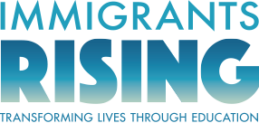The Future is Unindoctrinated
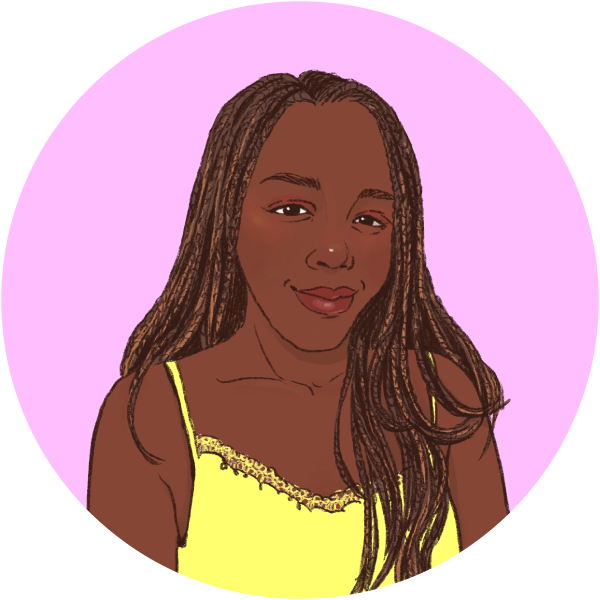 |
Shirleen Achieng Spiritually aligned, emotionally driven, Black womanist, radical Pan-African |
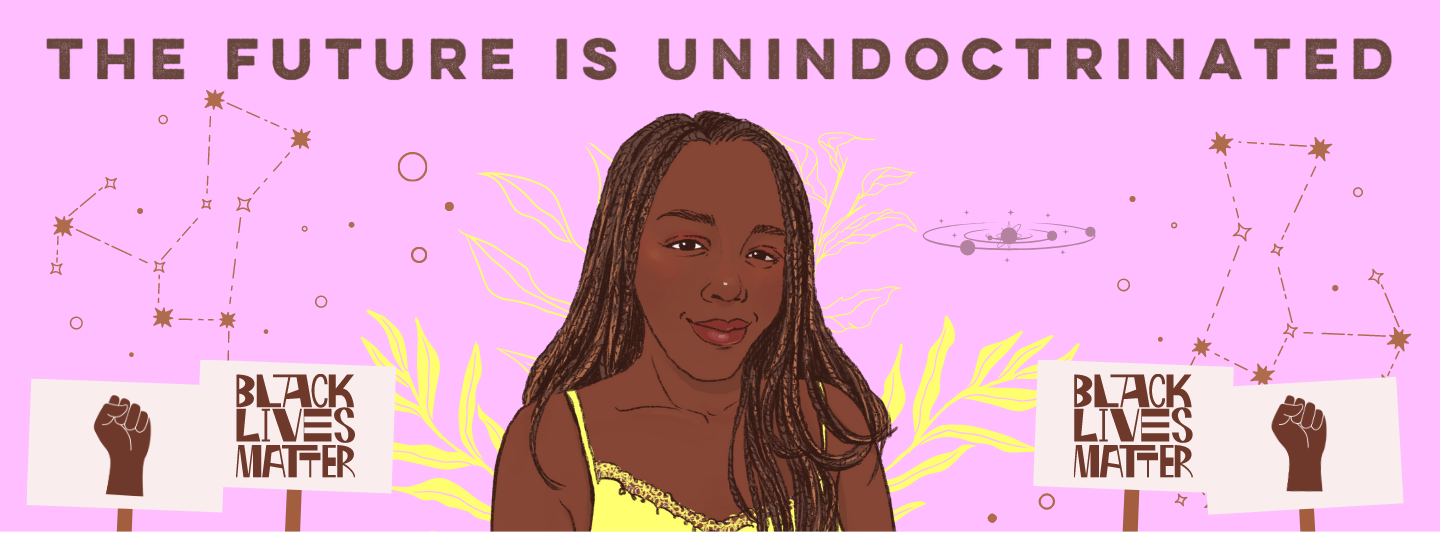
It’s a very weird time to be alive. I’m already at the point mentally, like—this is enough. We are at the brink. Some sort of revolution needs to happen. In 2020 when the George Floyd murder occurred, I really had to reflect on what my purpose is as a Black person in this country whose life is worthless to the state. And I realized that abolition work is very much, at this point, a necessity. It’s not a matter of reform.
I grew up in Kenya and I was there until I was 12. As a kid, I wanted to come to America so badly. I thought it was the land of milk and honey. And then coming here I realized the American dream is a hoax, especially if you’re Black. In high school I knew, I’m here without papers. That was the terminology that I used, but I didn’t understand yet what it meant to be undocumented. DACA wasn’t an option for me, just like it isn’t for so many other Black immigrants. I never had that safety net.
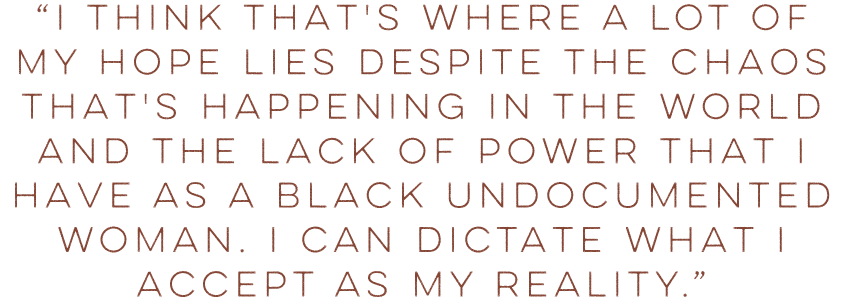
The immigration system as we know it in the U.S. is rooted in anti-Blackness. It’s not the mainstream narrative that you hear, but the majority of people in detention centers are actually Haitian. These detention spaces and prisons, they make money from each person they’re holding. The more I open my eyes to the pervasiveness of anti-Blackness, the more I ask myself, what does citizenship actually mean for me when, in a sense, I would still be viewed as illegal even if I had citizenship?
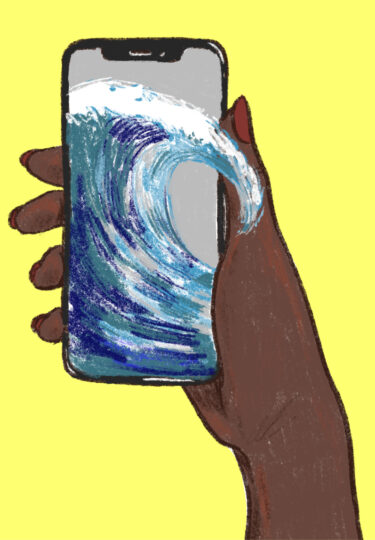
Working on the guide to supporting Black Undocumented students, I was really proud to hold space for others like me. For many of our focus group participants, it was their first time in a space centering them. Some didn’t feel safe enough to even say they’re undocumented. They’re not comfortable owning it yet. That hit me hard. When you’re so open about your status you forget that’s not the case for a lot of people. I just hope that more Black undocumented students will see that we exist. We’re out here!
Being Black and undocumented means having a double lens that gives me the ability to see things with a lot of nuance. I think because of our invisibility, because nobody even knows that we exist, I have more empathy towards other marginalized groups that also feel like they’re overlooked.
We are seeing the devastating effects of climate change across the world, but for those of us who are not experiencing it as immediately or as regularly, it feels so far removed. It’s really just looking at videos on our phones of people affected by hurricanes, by volcanoes, until it reaches our doorstep. So what can we do before that happens to mitigate the impact? Even though we know it’s systemic and corporations are the ones that have the power, it does not take away from our individual agency. I think that’s where a lot of my hope lies despite the chaos that’s happening in the world and the lack of power that I have as a Black undocumented woman. I can dictate what I accept as my reality.
I’ve been doing a lot of intuitive work. I’m learning how to tap into my inner voice and actually listen to what I want. I can choose my desired reality despite the circumstances around me. I don’t have to limit the size of my dreams. What was true prior to what colonizers brought in? What did my ancestors believe in? Questions like these give me power.
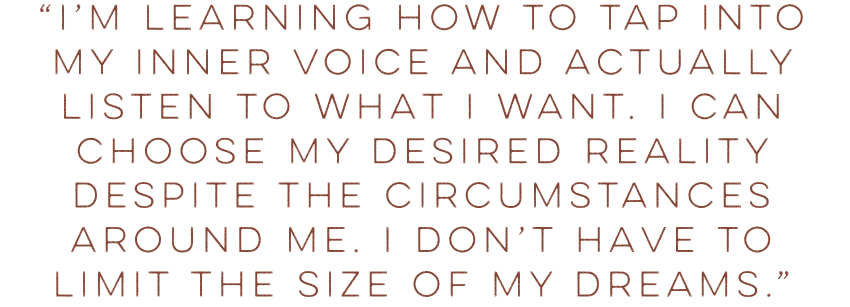
In college I studied public health and got interested in sustainability. It was taking African Studies classes that made me realize that sustainability is not a new, Western concept. Growing up in a low income household in Nairobi, meat was a luxury. We had it maybe once a month or if it was somebody’s birthday. We didn’t even have a refrigerator because all the food we cooked was eaten that same day. There was a constant passing down of clothes and reusing of containers. That’s how we lived, but it wasn’t until I left that it really clicked for me that those were ingrained sustainable practices. Meanwhile, in the States there is a lot of talk about being green, but the culture of consumerism is so strong.

For my mum’s generation and my grandmother’s it was very ingrained that education was the way out of poverty. My problem with academia is that it’s not accessible to the communities that need that knowledge. Unless something is inclusive and accessible to everyone, it’s not really sustainable. For me, if you want to see a better world, it’s not going to be through academia, it’s going to be through organizing. That’s why I made the difficult decision not to pursue medical school after college, which was my mum’s vision for me. Basically I realized, why am I putting so much energy into something that’s not even mine?
The thing is, we can undo our conditioning. We can eradicate the way we’ve been taught to view each other. Even who we’re attracted to. Your gender, your sex, it doesn’t matter. It could just be your energy, how you make me feel. There would be no need to think, I need to be hetero or I need to be this. I hope that exists in the future. Or if I don’t live to see it, at least I nurtured the young minds that helped set the stage for that.
My ideal world is borderless. There’s no nation state. All basic needs are met: food, housing, education, healthcare. It’s all accessible to everyone. If people didn’t have to worry about finances, or basic needs, then they’d be able to tap into what they really want, in an unlimited way. We’d all be able to tap into our creative capacity. In that universe, I would travel. I would be a tourist in my own country because Kenya is so beautiful, but I never had the chance to really see it. Black people are everywhere, you know. Afro Latinos, Black Asians. I dream of being able to go to different parts of the world to just see how Black people are living.

Doing spiritual work, I’ve realized that the more you sit with yourself, the more you hear your own intuition speaking to you. The more you radically love yourself, including what you’ve been conditioned to hate. I am learning to accept my “ugly duck parts,” those shadow aspects of myself that I’ve been taught to turn away from.
People tell me I’m wise for a 24-year-old, like I’ve lived many lives. The funny thing that I always say is, this is my last life. That’s why I’m in such a hurry. I have so much to say and I have to do this, this, and this because I’m not coming back to earth again. I want to experience higher things, go to a different planet.
About the Storyteller: Born in Kenya and now living in Orange County, California, Shirleen was a former Immigrants Rising Education Fellow and the co-author of the Guide to Effectively Supporting Black Undocumented Students. Check out her website to learn more about her spiritual mindfulness work: shirleensdivineself.com.
